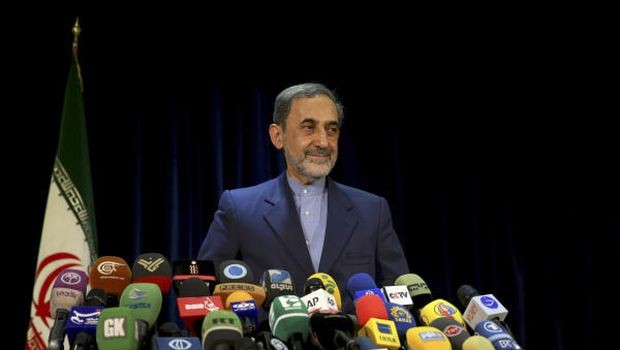
Former Iranian foreign minister Ali Akbar Velayati, a senior advisor to supreme leader Ayatollah Ali Khamenei, attends a press conference after registering his candidacy for the presidential election at the election headquarters of the interior ministry in Tehran, Iran, on Saturday, May 11, 2013. (AP Photo)
For many years, Ali Akbar Velayati was known as the top man in Iranian diplomacy. He served as Iran’s foreign minister for 16 years, from 1981 until 1997, during the presidencies of Ayatollah Khamenei and Ali Akbar Hashemi Rafsanjani.
Notably, he is among those whose policies solidified Iran’s general hard-line stance, particularly toward the West. Velayati currently serves as a senior advisor on international affairs to Supreme Leader Ali Khamenei. He is a conservative, and is known to be close to both Ayatollah Khamenei and Hashemi Rafsanjani.
Before the revolution
Prior to Iran’s Islamic revolution, Velayati was interrogated several times and was monitored by the SAVAK state security agency for encouraging students to participate in anti-shah protests.
In 1961, he became a member of the National Front, a political party founded by secular Iranian leaders with a nationalist, socially liberal and social-democratic political orientation.
“I was looking for a place to continue my political activities. At that time, the National Front and the Freedom Movement were the only existing political entities. Following the demise of Ayatollah Boroujerdi, I followed Imam Khomeini. On June 6, 1963, I separated from the National Front and began to involve myself with religious scholars and activists,” Velayati recalls.
A war-era foreign minister
In an interview with the Mehr news agency, Velayati stated that the negotiations to end the eight-year war between Iran and Iraq (1981–1989) were the toughest period of his career as foreign minister.
“The most difficult and complicated negotiations during my 16 years as foreign minister were the peace negotiations between Iran and Iraq, which continued between 1988 and 1990. The Iraqis did not fulfil their commitments and intended to gain through negotiations what they could not achieve through war,” he said.
The Mykonos case
Velayati was one the Iranian officials who was embroiled in the notorious Mykonos assassination case, involving a 1992 attack at Berlin’s Mykonos restaurant that killed four Iranian Kurdish opposition leaders.
In an April 10, 1997, ruling, the Berlin court overseeing this case issued an international warrant for the arrest of former intelligence minister Ali Fallahian; the court also mentioned the names of a number of other Iranian officials, including Velayati. The ruling created a diplomatic row between the governments of Iran and several European states, leading to the withdrawal of EU ambassadors from Tehran. Diplomatic relations were resumed in mid-1997, when Mohammad Khatami was elected president.
Stance on Syria
In January 2013, Velayati was quoted by the Mehr news agency as saying that “Iran believes that any attack against Syria is an attack on itself.”
“Syria plays a key role in supporting—or, God forbid, destabilizing—the resistance front. For this same reason, an attack on Syria is considered an attack on Iran and Iran’s allies,” Velayati said.
Velayati also characterized Syrian support for the Lebanese armed group Hezbollah and Palestinian Hamas as being vital, to the point that he claimed that these groups “would have been defeated in wars with Israel without Syrian support.”
“If Syria didn’t provide logistical support to Hezbollah, Hezbollah and Hamas would never have achieved victory in the 33-day war [the 2006 war between Israel and Hezbollah] or the 22-day war [the 2008–2009 Gaza war].”
Presidential hopeful
During Iran’s 2005 presidential election, Ali Akbar Velayati entered the race only to withdraw, apparently in support of former president Ali Akbar Hashemi Rafsanjani.
According to Press TV, Velayati claims that if he emerges victorious in the forthcoming presidential elections, his electoral coalition “will form the most powerful Iranian government.”
He recently said that his group will seek to introduce a strong team to deal with the economic, social and political issues facing the country.
Velayati is a member of the 2+1 Coalition, which also includes senior lawmaker Gholam Ali Haddad-Adel (who has since withdrawn from the race) and Tehran mayor Mohammad Baqer Qalibaf.
Timeline
• 1945: Born June 24 in Shemiran, north of Tehran.
• 1971: Receives his MD from the University of Tehran.
• 1974: Receives a higher degree in paediatrics from Johns Hopkins University in the US.
• 1981–1997: Serves as minister of foreign affairs under Ayatollah Ali Khamenei and Ali Akbar Hashemi Rafsanjani.
• 1988–present: Appointed as a founding member of Iran’s Expediency Discernment Council.
• 1997–present: Serves as senior international affairs advisor to Iran’s supreme leader, Ali Khamenei.
This article is part of a series of Asharq Al-Awsat profiles of the Iranian presidential candidates
